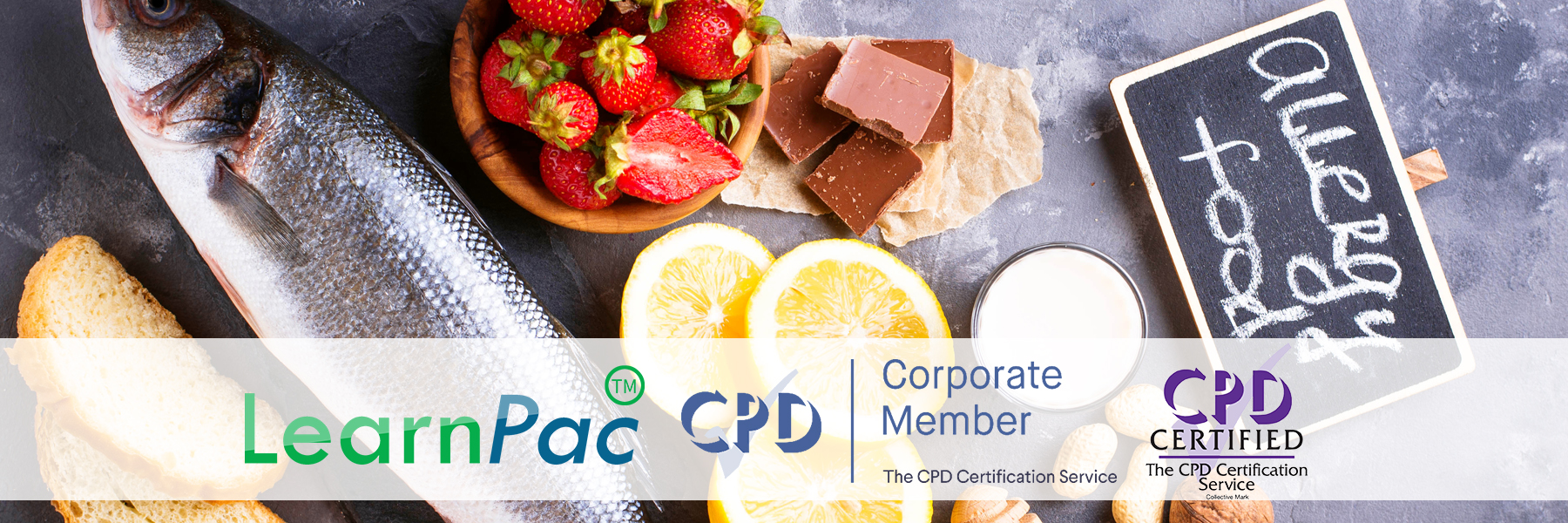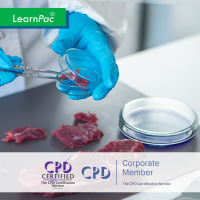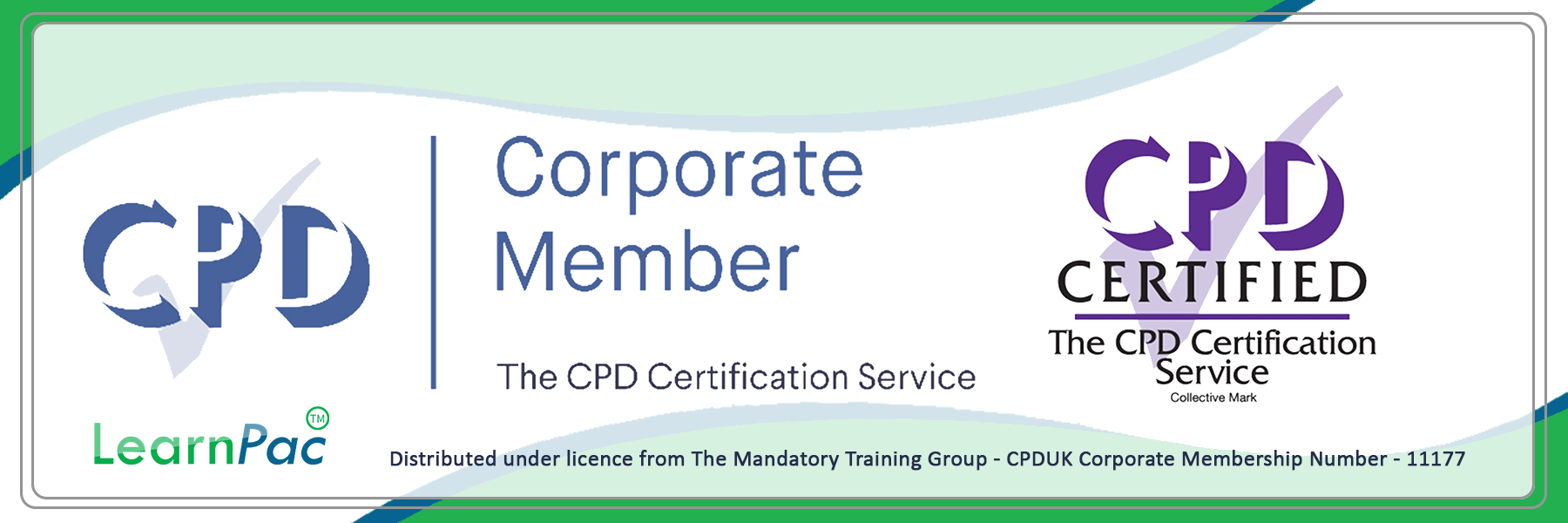Allergen Awareness - E-Learning Courses - CPDUK Accredited

Allergen Awareness – E-Learning Courses with Certificates – CPDUK Accredited.
LearnPac Systems is the leading UK provider of accredited statutory and mandatory training courses for all sectors, including health and social care, education, local government, private and charity sectors.
Allergen awareness eLearning courses provides the safety of those consuming food and understands the necessary precautions. Awareness of allergens also helps to ensure the safety of those consuming food but also in compliance with government regulations.
Our allergen awareness e-Learning courses will help learners to understand the cause of allergen and to prevent encountering such problems and health issues. Further, they can buy with confidence, reduce risk of allergic reactions to food, and increase food choices.
Browse our Allergen Awareness - E-Learning Courses
-

Anaphylaxis Awareness Training – Online Course – Level 2 – CPD Accredited
£ 19.99 excl. VAT Buy now -

Food Safety in Health and Care – Level 1 – Online Course – CPD Accredited
£ 14.99 excl. VAT Buy now -

Food Safety Training – Level 2 – Online Training Course – CPDUK Accredited
£ 19.99 excl. VAT Buy now -

Nutrition and Hydration – Online Training Course – CPDUK Accredited
£ 19.99 excl. VAT Buy now
Allergen Awareness: Frequently Asked Questions and Answers
Allergen Awareness – E-Learning Courses with Certificates – CPDUK Accredited – LearnPac Systems UK.
Here at LearnPac Systems, we receive many questions about allergen awareness. We have provided answers to the most frequently asked questions about allergen awareness.
Click on the text below to see the answers to the Frequently Ask Questions about Allergen Awareness.
An allergen is usually a harmless substance competent of activating a response in the immune system that results in an allergic reaction. Other common allergens include dust mites, animal dander, mould, medications, insect venoms and various foods.
LearnPac Systems is the leading UK provider of accredited statutory and mandatory training courses for all sectors, including health and social care, education, local government, private and charity sectors.
Click here for Anaphylaxis Awareness Training – Online Course – Level 2 – CPD Accredited
It is essential to know the cause and preclusion to protect consumers from encountering problems and health issues that could even cause legal proceedings against an entrepreneur.
LearnPac Systems is the leading UK provider of accredited statutory and mandatory training courses for all sectors, including health and social care, education, local government, private and charity sectors.
Click here for Food Safety in Health and Care – Level 1 – Online Course – CPD Accredited
It creates awareness among allergic consumers or customers so they can purchase with confidence, reduce their risk of allergic reactions to food, and increase their food choices.
LearnPac Systems is the leading UK provider of accredited statutory and mandatory training courses for all sectors, including health and social care, education, local government, private and charity sectors.
Click here for Improving Self-Awareness Training – Online Course – CPD Accredited
Food allergen awareness training provides the safety of those consuming food and understands the necessary precautions. Awareness of allergens also helps to ensure the safety of those consuming food but also in compliance with government regulations.
An allergen control program (ACP) is a well-organised method for identifying and controlling allergens, from the incoming ingredients to the final packaged product in any food processing facility.
Chemical hazards include toxins, pollutants, drugs, allergens, or ingredients that can cause illness due to immediate or long-term exposure.
You might develop an allergy if you have a family history of asthma or allergies, such as hay fever, hives or eczema.
Young children are likely to develop food allergies than older children or adults. Also, having a parent or sibling with a food allergy increases your risk of having another food allergy. People with food allergies tend to have more than one.
We can find allergens in a variety of sources, such as dust mite excretion, pollen, pet dander, or even royal jelly. Food allergies are not as common as a food sensitivity. But some foods such as peanuts (a legume), nuts, seafood and shellfish are the cause of severe allergies in many people.
The following are the most common food allergies:
- Cow’s Milk
- Eggs
- Tree Nuts
- Peanuts
- Shellfish
- Wheat
- Soy
- Fish.
Some people, most often children, may end an allergy entirely. Others find their allergy symptoms lighten up as they get older. Because the immune system can weaken as they get older, and perhaps can’t assemble as strong a reaction to the allergen.
All certified food protection managers (CFPMs) working in a restaurant must take and complete the additional allergen training using an approved allergen awareness training program. Certificate of course completion should be retained at the establishment, made available to the health inspector upon request and is an item on the inspection report.
Restaurants assigned as category I (High Risk) by their local health department must undergo allergens awareness training. A restaurant defined as any business that is primarily engaged in the sale of ready-to-eat food for immediate consumption.
- Food allergies are increasing in prevalence, are potentially life-threatening, and there is no cure.
- Successful management is through avoidance of the food.
- Consumers’ lives are at risk from eating formulated foods (hidden ingredients).
- Awareness, education & communication can prevent deaths & improve the quality of life of food allergic consumers.
The aims of the training are the following:
1) Identify common food allergens and the symptoms of an allergic reaction.
2) Recognise and explain the risks associated with food allergies and food intolerance.
3) Demonstrate practical procedures which control the risk of allergen contamination in food.
This course is suitable for food handlers of all levels, including those in a managerial position, a full time, part-time or voluntary role. Anyone who handles food has a responsibility to ensure that it is safe to eat for the consumer. It includes ensuring that they are fully up-to-date with knowledge of food allergens, including how to identify and control them.
- Complete the food allergen awareness course online and print your copy of your result certificate.
- The certificate will be confirmed from our end to ensure full compliance, which may take up to three working days.
- Once the certificate is issued, you can print it from the “My Purchases, Results & Certificates” menu.
This course is best suited for food handlers in catering and retail settings. The course is appropriate for workers at all levels, whether they prepare, handle, sell or serve food products. It includes, but is not limited to, staff that work in:
- Restaurants, canteens and hotels
- Cafes, coffee and sandwich shops
- Supermarkets and convenience stores
- Bakeries, butchers and delicatessens
- Food markets, stalls and food trucks
- Food buffets
- Takeaways
- Online food retailers and other distance sellers.
Some people are allergic to particular foods or ingredients in cooking. All food businesses should be aware of food allergens to protect their customers and avoid legal consequences.
A group of the eight primary allergenic foods is frequently called Big-81. It comprises milk, eggs, fish, crustacean shellfish, tree nuts, peanuts, wheat and soybean.
Allergies develop when your immune system mistakenly identifies a substance such as pollen, mould, animal dander, or food as harmful. The allergen stimulates immune system cells to release certain chemicals, such as histamine, which then lead to allergy symptoms.
You probably don’t know if you’re allergic and it could kill you. When people think of fatal allergy attacks, they usually think of bee stings, shellfish or peanut allergies. But a new nationwide study has found that the most deadly allergy is prescription drugs.
Allergies cause symptoms that happen all at once. Cold symptoms generally last 7 to 10 days, whereas allergy symptoms continue with exposure to the allergen (symptom trigger). Allergy symptoms may get better or go away soon after the elimination of allergen exposure.
No, but you can treat and control your symptoms. They don’t cure allergies, but they may significantly reduce your sensitivity to your allergy triggers and reduce your allergic response. Sometimes children outgrow their allergies, particularly those to food.
Here are some ways to manage your allergies:
- Avoid your allergens
- Take your medicines as prescribed
- Keep your epinephrine auto-injectors with you at all times
- Keep a diary
- Wear a medical alert bracelet (or necklace)
- Know what to do during an allergic reaction.
Natural ways to defeat allergies include:
- Shut out breezes
- Consider alternative treatments
- Wash up
- Wear a mask
- Eat healthy foods
- Rinse it out
- Drink more
- Go natural.
These seven foods might help alleviate seasonal allergy symptoms:
- Ginger
- Bee pollen
- Citrus fruits
- Turmeric
- Tomatoes
- Salmon and other oily fish
- Onions.
Antihistamines, corticosteroids, or decongestants can treat minor allergy symptoms. Saline nasal rinses can utilise for congestion-related allergy symptoms. You can also use corticosteroid creams to treat skin rashes related to allergies. Lastly, immunotherapy is a long-term treatment option for chronic allergy symptoms.
Treatment for allergies could be one of the following:
- Oral antihistamines
- Decongestants
- Nasal spray
- Combination medications.
To diagnose a food allergy, an allergist might do a blood test in addition to skin testing. It involves taking a small blood sample to send to a laboratory for analysis. The lab checks the blood for IgE antibodies to specific foods.
Level 2 is an award in food safety in catering. The purpose of the free-standing qualification is at anyone in the catering industry who handles and prepares food and presumes no prior experience. A high standard of food safety protects consumers’ health and helps to maintain the reputation of the business.
Your allergist may recommend allergy tests, such as a skin test or blood test, to determine if you have a food allergy. In an allergy skin test for food, a tiny drop of a liquid food extract, one for each food need to be tested, is placed on the skin.
Allergenicity is the potential of a material to cause sensitisation and allergic reactions. It frequently associated with IgE antibodies.
Hypersensitivity reactions include:
- Type I: Immediate Hypersensitivity (Anaphylactic Reaction)
- Type II: Cytotoxic Reaction (Antibody-dependent)
- Type III: Immune Complex Reaction
- Type IV: Cell-Mediated (Delayed Hypersensitivity).
The ServSafe food protection manager certification and ServSafe food handler are two different programs. Most states require the ServSafe food protection manager certification. In contrast, the ServSafe food handler is considered optional training for staff members.
You could retake the test if you did not pass the examination. You may take the test twice within 30 days. If you don’t pass your second attempt, you must wait at least 60 days from your most recent attempt before retaking the exam.
Peanuts can be dangerous. Peanuts are one of the most common causes of food-related allergy death. They can trigger anaphylaxis, which is a reaction that may be fatal if not treated right away. Symptoms usually start within minutes of exposure.
When you visit an allergist, the doctor will:
- Take a medical history. The doctor will ask about your health, your symptoms, and whether members of your family have asthma or allergies such as hay fever, hives or skin rashes like eczema.
- Ask you about your symptoms
- Do a physical exam
- Conduct allergy tests.
Consider apple cider vinegar. Apple cider vinegar purported to boost the immune system, help break up mucus, and support lymphatic drainage. Experts recommend mixing one to two tablespoon of apple cider vinegar with a glass of water and lemon juice three times a day to relieve allergy symptoms.
Food intolerance or a reaction to another substance you ate may cause the same signs and symptoms as a food allergy does, such as nausea, vomiting, cramping and diarrhoea. Conversely, if you have a real food allergy, even a tiny amount of food may trigger an allergic reaction.
Common symptoms of an allergic reaction include:
- Sneezing and an itchy, runny or blocked nose (allergic rhinitis)
- Itchy, red, watering eyes (conjunctivitis)
- Wheezing, chest tightness, shortness of breath and a cough
- A raised, itchy, red rash (hives)
- Swollen lips, tongue, eyes or face.
Eczema is an itchy, scaly, rash that may be caused by food allergies, especially in very young children. When you have eczema, your skin is inflamed and develops dry patches that flake off. Foods that commonly trigger eczema include dairy, nuts, wheat, soy, and eggs.
The best remedy for skin allergy are as follows:
- Hydrocortisone cream
- Ointments like calamine lotion
- Antihistamines
- Cold compresses
- Oatmeal baths
- Talk to your doctor about what is best for your specific rash. For example, corticosteroids are useful for poison ivy, oak, and sumac. Doctors can prescribe stronger medicines if needed, too.
A skin prick test, also called a puncture or scratch test, checks for immediate allergic reactions to as many as 40 different substances at once. This test usually is done to identify allergies to pollen, mould, pet dander, dust mites and foods. Then they use a lancet to prick the extracts into the skin’s surface.
Positive tests, however, are not always accurate. About 50-60% of all SPTs yield “false positive” results, meaning that the analysis shows positive even though you are not allergic to the food tested.
The pricking part of scratch and intradermal tests takes about 5 to 10 minutes. Then you’ll wait about 15 minutes to observe how your skin reacts. Patch tests take more time and two visits to your doctor. You’ll have to wear a patch for about 48 hours in case you have a delayed reaction to the allergen.
Food safety and hygiene level 2 online training is a legal requirement for anybody who regularly handles food, whether during production, preparation or sale. Our course is CPD accredited and provides certificates upon completion.
A level 2 food hygiene certificate is required to satisfy a food handler’s legal obligation for food safety training. However, if you are going to be responsible for other staff at your premises, you will need to ensure that you or any supervisors are prepared to level 3.
Food sensitivity tests are unable to diagnose true food allergies. Though some may help recognise food sensitivities, insurance companies often don’t cover the tests.
Below are the most common methods used to identify food allergies:
- Medical history
- Prick tests
- ELISA testing
- RAST tests
- Elimination diet
- Oral food challenge.
Allergies occur when your immune system reacts to a foreign substance, such as pollen, bee venom or pet dander or a food that doesn’t cause a reaction in most people. When you come into contact with the allergen, your immune system’s response can inflame your skin, sinuses, airways or digestive system.
Yes, allergy shots are expensive. However, allergy shots may cost no more than the combined cost of medicine, doctor and emergency room visits, and missed days of school or work over several years. However, you may need to take regular shots for 3 to 5 years, and it may take a year or more for symptoms to improve.
LearnPac Systems is the leading UK provider of accredited statutory and mandatory training courses for all sectors, including health and social care, education, local government, private and charity sectors.
On successful completion of each of the allergen awareness courses modules, you will be able to download, save and/or print a quality assured continuing professional development (CPD) certificate. Our CPD certificates are recognised internationally and can be used to provide evidence for compliance and audit.
The CPD Certification Service (CPDUK) accredits all of our statutory and mandatory training courses as conforming to universally accepted Continuous Professional Development (CPD) guidelines.
LearnPac Systems is distributed under the licence from The Mandatory Training Group – CPDUK Corporate Memebrship Number – 1117.

